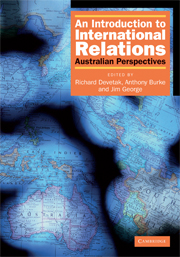Book contents
- Frontmatter
- Contents
- List of tables, figures and boxes
- List of contributors
- Preface and acknowledgments
- An introduction to international relations: the origins and changing agendas of a discipline
- 1 Theory and practice in Australian international relations: the search for identity and security
- Part 1 Theories of international relations
- 2 International relations theory in an era of critical diversity
- 3 Liberalism
- 4 Realism
- 5 Marxism
- 6 Feminism
- 7 Postmodernism
- 8 Constructivism and critical theory
- 9 Global justice and cosmopolitan democracy
- Part 2 The traditional agenda: states, war and law
- Part 3 The new agenda: globalisation and global governance
- Glossary of terms
- Bibliography
- Index
- References
6 - Feminism
from Part 1 - Theories of international relations
- Frontmatter
- Contents
- List of tables, figures and boxes
- List of contributors
- Preface and acknowledgments
- An introduction to international relations: the origins and changing agendas of a discipline
- 1 Theory and practice in Australian international relations: the search for identity and security
- Part 1 Theories of international relations
- 2 International relations theory in an era of critical diversity
- 3 Liberalism
- 4 Realism
- 5 Marxism
- 6 Feminism
- 7 Postmodernism
- 8 Constructivism and critical theory
- 9 Global justice and cosmopolitan democracy
- Part 2 The traditional agenda: states, war and law
- Part 3 The new agenda: globalisation and global governance
- Glossary of terms
- Bibliography
- Index
- References
Summary
Introduction
This chapter examines the different feminist approaches to the study and practice of international relations. It highlights the similarities between approaches, but also the differences. It does this first by tracing the interventions made by feminists into international relations and the creation of a distinctly feminist agenda. Second, it uses the ‘gender lens’ to demonstrate how experiences and understandings in international relations can be gendered and analyses the consequences of this gendering. Finally it explains and critiques the different feminist approaches to international relations.
International relations meets feminism
Like international relations generally, feminist international relations is a broad and diverse field of study. It is a field that is rich with debate, controversy, cutting-edge research, and challenging new methodological approaches. Feminist international relations scholars are often necessarily interdisciplinary, synthesising international relations with gender, cultural, post-colonial and even environmental studies while also drawing heavily from more traditional disciplines. Feminist scholars have made important contributions to international relations theory, security studies, international political economy, development studies, international law, and questions of global governance, among other fields.
While feminist international relations encompasses numerous feminisms which are based on distinct theoretical approaches, feminist international relations scholars have a common commitment to highlighting and addressing the disadvantage that many women suffer in international politics. This disadvantage covers, first, the lack of access that women have to political and decision-making power and to economic resources.
- Type
- Chapter
- Information
- An Introduction to International RelationsAustralian Perspectives, pp. 75 - 85Publisher: Cambridge University PressPrint publication year: 2007
References
- 1
- Cited by

